
Hãy nhập câu hỏi của bạn vào đây, nếu là tài khoản VIP, bạn sẽ được ưu tiên trả lời.


\(6x^2-7x-20\)
\(=6x^2-15x+8x-20\)
\(=6x\left(x-\dfrac{5}{2}\right)+8\left(x-\dfrac{5}{2}\right)\)
\(=\left(6x+8\right)\left(x-\dfrac{5}{2}\right)\)
\(=2\left(3x+4\right)\left(x-\dfrac{5}{2}\right)\)
\(b,x^3-4x^2-4x-5\)
\(=x^3-5x^2+x^2-5x+x-5\)
\(=x^2\left(x-5\right)+x\left(x-5\right)+\left(x-5\right)\)
\(=\left(x^2+x+1\right)\left(x-5\right)\)
Bạn có thể dung máy tính CASIO fx-570ES PLUS để giải hệ phương trình và phương trình.
Bayh mình giải hộ bạn nha
a, 6x2 - 7x - 20 = 6x2 -15x + 8x - 20
= 3x(2x-5)+4(2x-5)
= (3x+4)(2x-5)
b, x3 - 4x2 - 4x - 5= x3 -5x2 +x2 -5x+x-5 = x2(x-5)+x(x-5)+x-5
= (x-5)(x2 +x+1) . Đến đây thì ko cần phân tích tiếp nữa vì x2 +x+1 phân tích sẽ ra VN và căn nha bạn.
c, x4 + 6x3 + 7x2 – 6x + 1 = x4 + 6x3 – 2x2 + 9x2 – 6x + 1
= x4 + 2x2(3x – 1) + (3x)2- 2.3x.1+12
= (x2)2 +2.x2 (3x-1) + (3x-1)2
= (x2 + 3x – 1)2

\(a,-2x\left(2-3x\right)+3\left(-5+7x-6x^2\right)=-4\)
\(\Rightarrow-4x+6x^2-15+21x-18x^2=-4\)
\(\Rightarrow-12x^2+17x-11=0\)
\(\Rightarrow12x^2-17x+11=0\)
\(\Rightarrow9x^2-2.3.\frac{17}{6}x+\left(\frac{17}{6}\right)^2-\left(\frac{17}{6}\right)^2+11=0\)
\(\Rightarrow\left(3x-\frac{17}{6}\right)^2+\frac{107}{36}=0VN\)
Không có gt x thỏa mãn
\(b,-3x\left(-1+3x-4x^2\right)+6x^2\left(-2x+3\right)=0\)
\(\Rightarrow3x-9x^2+12x^3-12x^3+18x^2=0\)
\(\Rightarrow9x^2+3x=0\)
\(\Rightarrow3x\left(3x+1\right)=0\)
\(\Rightarrow\orbr{\begin{cases}3x=0\\3x+1=0\end{cases}\Rightarrow\orbr{\begin{cases}x=0\\3x=-1\end{cases}\Rightarrow}\orbr{\begin{cases}x=0\\x=-\frac{1}{3}\end{cases}}}\)


a) Ta có: \(\left(2x+3\right)^2-\left(5+x\right)\left(2x+3\right)=0\)
\(\Leftrightarrow\left(2x+3\right)\left(2x+3+5+x\right)=0\)
\(\Leftrightarrow\left(2x+3\right)\left(3x+8\right)=0\)
\(\Leftrightarrow\left[{}\begin{matrix}2x+3=0\\3x+8=0\end{matrix}\right.\Leftrightarrow\left[{}\begin{matrix}2x=-3\\3x=-8\end{matrix}\right.\Leftrightarrow\left[{}\begin{matrix}x=\frac{-3}{2}\\x=\frac{-8}{3}\end{matrix}\right.\)
Vậy: \(x\in\left\{\frac{-3}{2};\frac{-8}{3}\right\}\)
b) Ta có: \(\left(2x+5\right)^2-\left(2x-5\right)^2=6x+8\)
\(\Leftrightarrow\left(2x+5+2x-5\right)\left(2x+5-2x+5\right)-6x-8=0\)
\(\Leftrightarrow40x-6x-8=0\)
\(\Leftrightarrow34x=8\)
\(\Leftrightarrow x=\frac{8}{34}=\frac{4}{17}\)
Vậy: \(x=\frac{4}{17}\)
c) Ta có: \(\left(4x+3\right)^2=4\left(x-1\right)^2\)
\(\Leftrightarrow16x^2+24x+9=4\left(x^2-2x+1\right)\)
\(\Leftrightarrow16x^2+24x+9-4x^2+8x-4=0\)
\(\Leftrightarrow12x^2+32x+5=0\)
\(\Leftrightarrow12x^2+2x+30x+5=0\)
\(\Leftrightarrow2x\left(6x+1\right)+5\left(6x+1\right)=0\)
\(\Leftrightarrow\left(6x+1\right)\left(2x+5\right)=0\)
\(\Leftrightarrow\left[{}\begin{matrix}6x+1=0\\2x+5=0\end{matrix}\right.\Leftrightarrow\left[{}\begin{matrix}6x=-1\\2x=-5\end{matrix}\right.\Leftrightarrow\left[{}\begin{matrix}x=\frac{-1}{6}\\x=\frac{-5}{2}\end{matrix}\right.\)
Vậy: \(x\in\left\{\frac{-1}{6};\frac{-5}{2}\right\}\)
d) Ta có: \(\left(7x-1\right)\left(3x-2\right)-49x^2+14x=1\)
\(\Leftrightarrow\left(7x-1\right)\left(3x-2\right)-\left(49x^2-14x+1\right)=0\)
\(\Leftrightarrow\left(7x-1\right)\left(3x-2\right)-\left(7x-1\right)^2=0\)
\(\Leftrightarrow\left(7x-1\right)\left[3x-2-\left(7x-1\right)\right]=0\)
\(\Leftrightarrow\left(7x-1\right)\left(3x-2-7x+1\right)=0\)
\(\Leftrightarrow\left(7x-1\right)\left(-4x-1\right)=0\)
\(\Leftrightarrow\left[{}\begin{matrix}7x-1=0\\-4x-1=0\end{matrix}\right.\Leftrightarrow\left[{}\begin{matrix}7x=1\\-4x=1\end{matrix}\right.\Leftrightarrow\left[{}\begin{matrix}x=\frac{1}{7}\\x=\frac{-1}{4}\end{matrix}\right.\)
Vậy: \(x\in\left\{\frac{1}{7};\frac{-1}{4}\right\}\)

a) B = \(x^2+2x+1=0\)
\(\Leftrightarrow\left(x+1\right)^2=0\)
\(\Leftrightarrow x=1\)
Ap dung dinh li Be du, ta có A chia hết cho B khi số dư = 0.
A = \(f\left(1\right)=1^4-3.1^3+6.1^2-7m+m=0\)
\(\Leftrightarrow m=\dfrac{2}{3}\)
Các câu còn lại đơn giản, áp dụng như câu a là được.
a ) Theo lược đồ hooc - ne
1 1 -3 6 -7+m 1 -2 4 -3+m
Để \(A\) chia hết cho B thì :
\(-3+m=0\Rightarrow m=3\)
Vậy \(m=3\)

Bài 1:
b: \(x^3-4x^2+7x-6=0\)
\(\Leftrightarrow x^3-2x^2-2x^2+4x+3x-6=0\)
\(\Leftrightarrow\left(x-2\right)\left(x^2-2x+3\right)=0\)
=>x-2=0
hay x=2
c: \(2x^3+7x^2+7x+2=0\)
\(\Leftrightarrow2\left(x+1\right)\left(x^2-x+1\right)+7x\left(x+1\right)=0\)
\(\Leftrightarrow\left(x+1\right)\left(2x^2-2x+2+7x\right)=0\)
\(\Leftrightarrow\left(x+1\right)\left(2x^2+5x+2\right)=0\)
\(\Leftrightarrow\left(x+1\right)\left(2x^2+4x+x+2\right)=0\)
=>(x+1)(x+2)(2x+1)=0
hay \(x\in\left\{-1;-2;-\dfrac{1}{2}\right\}\)
d: \(2x^3-9x+2=0\)
\(\Leftrightarrow2x^3-4x^2+4x^2-8x-x+2=0\)
\(\Leftrightarrow\left(x-2\right)\left(2x^2+4x-1\right)=0\)
\(\Leftrightarrow\left(x-2\right)\left(x^2+2x-\dfrac{1}{2}\right)=0\)
\(\Leftrightarrow\left(x-2\right)\left(x^2+2x+1-\dfrac{3}{2}\right)=0\)
\(\Leftrightarrow\left(x-2\right)\left(x+1+\dfrac{\sqrt{6}}{2}\right)\left(x+1-\dfrac{\sqrt{6}}{2}\right)=0\)
hay \(x\in\left\{2;-1-\dfrac{\sqrt{6}}{2};-1+\dfrac{\sqrt{6}}{2}\right\}\)

a: \(=2x+4x^2-6x^3-8x^4\)
b: \(=15x^5-12x^4+9x^3-18x^2\)
c: \(=-18x^5-24x^4+30x^3\)
d: \(=-28x^7+35x^4-42x^2\)
e: \(=6x^4y-2a\cdot x^3y^2+10x^2y^3\)
f: \(=2a^2b-18a^2b^2+4ab^3\)



